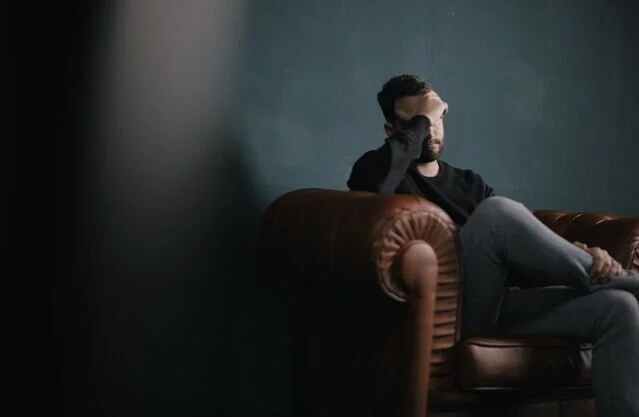My Life Is Improving, Why Am I Not Happier?
Our early anscestors passed on traits that lead us to attune to negative information more than positive.
Humans experience loss aversion, where losses are weighed more heavily than gains.
The hedonic treadmill can help us bounce back from setbacks, but also returns us to previous levels of well-being.
Humans are wired to focus on the negative aspects of life compared to the positive. Consistently practicing gratitude can help defend against this. Source: Nik Shuliahin/Unsplash
My husband and I have been in the process of purchasing a home. This new house will be an improvement from our previous dwelling in several ways. We'll finally have luxuries that were out of our reach in the past with greater square footage, an expansive yard for our children to explore, and a close-knit neighborhood to list a few.
Yet, with all of the wonderful upgrades to look forward to, I have found myself ruminating on the fireplace we decided to go without. And the floorplan with just a little more room that we passed up. And the lot with a slighter bigger yard. I stopped for a moment and recognized that while my standard of living was about to improve, I was stuck on what I wasn't getting. What was going on and how could I get out of this destructive pattern?
Negativity Bias
Unfortunately, we humans are susceptible to what psychologists call negativity bias. Our brains are wired to focus on the negative aspects of life compared to the positive. Of course, this bias served our early ancestors well when paying keen attention to risk and danger was a matter of life or death. This attunement kept them safe and thus more likely to pass this trait on to their posterity.
Loss Aversion
We also experience loss aversion where we weigh losses nearly twice as much as gains. For example, if you were to lose $100, your pain would be as intense as the joy of finding $200. So while I was looking forward to a covered patio, would I be able to let go of the perks of my old house and neighborhood? Would our new house be enough of an upgrade to improve my level of happiness?
The Hedonic Treadmill
The third strike against us is a constant battle with the hedonic treadmill. Psychologists have found that life events that change our level of happiness, typically only affect wellbeing short term. Lottery winners are happier temporarily, then return to their previous levels. Those who lose their job often feel initial sadness, but usually bounce back to their normal state.
There are some exceptions to the hedonic adaptation such as a chronic illness, which may have long-term effects on wellbeing, but many times we overestimate the effects of life events on our happiness. As Nobel prize-winning economist Daniel Kahneman said,
People are exposed to many messages that encourage them to believe that a change of weight, scent, hair color (or coverage), car, clothes, or many other aspects will produce a marked improvement in their happiness. Our research suggests a moral, and a warning: Nothing that you focus on will make as much difference as you think.
Humans are notorious for both intensity and duration biases when it comes to predicting their emotional states. Intensity bias is predicting an emotional response that is larger than the actual response, such as students overestimating their immediate reaction to a poor test grade. Duration bias is overestimating how long an event will affect our emotional state. For example, football fans may overestimate how long the feeling of elation after a team victory will last.
Defending Against Happiness Pitfalls
How then can we defend against negativity bias, loss aversion, and the hedonic treadmill? The first step is being aware of these pitfalls. Each time we find ourselves focusing on what we’re giving up, we can take a minute to appreciate the privileges that we do have. Practicing gratitude is one of the most underappreciated tools we have to defend against negativity. The more we engage in optimistic thinking, the more automatic it will become. Our brains are malleable and capable of creating new patterns that can help fend off unhelpful biases.
We can be mentally present during everyday pleasures as we savor a cup of coffee or pause to experience a breathtaking sunrise. As David Kessler said in his latest book, “Finding meaning is not extraordinary, it’s ordinary. It happens all the time, all over the world.”
Experiences often impact our happiness more than things. As psychologist Thomas Gilovich said, "We remember experiences long afterward, while we soon become used to our possessions." We can use our relationships, hobbies, and compassion to bolster happiness and stave off negativity. We can take time to share our new dining room table with a family in need. We can allow our paints and canvases to occasionally clutter up our space. We can use that fresh grass to toss a football around with our little ones.
We can use our relationships, hobbies, and compassion to bolster happiness and stave off negativity.
When I envision my upcoming house, I can focus on the unexceptional countertops, or I can envision them being used to break bread with a new family. I can contemplate on the empty corner where the fireplace should be, or I can imagine my children and their friends snuggled there, giggling through a silly book. I can feel the loss of choosing a relatively small lot of land, but that yard may be where I embrace a brokenhearted friend. I may not have the means for high-end furniture, but maybe that space will be used as a refuge for someone who’s just been rejected by their family.
I may want all the comfort material goods can give, but it is my relationships with others that give them meaning. There is no purpose to a living space without life.

